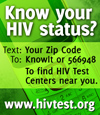Conversations on AIDS.gov with Admiral Joxel Garcia, U.S. Assistant Secretary for Health
Transcript
Mr. Gomez: I'm Miguel Gomez with AIDS.Gov. We're listening to conversations on AIDS.Gov. This is a Podcast series that addresses HIV/AIDS in the United States.
Today we're fortunate to hear from Admiral Joxel Garcia, the Assistant Secretary for Health, the U.S. Department of Health and Human Services or HHS.
Sir, thank you for joining us today.
Admiral Garcia: Thank you, Miguel, for the invitation.
Mr. Gomez: Sir, many of our listeners may not understand your role here at the U.S. Department of Health and Human Services. Could you please describe your role as the Assistant Secretary for Health?
Admiral Garcia: Well, I'm the lead health advisor for health and science and public health for our Secretary of Health and Human Services.
Mr. Gomez: Thank you, sir, and that is helpful. As the principal medical advisor to our Secretary we're going to be talking about AIDS in the Latino community. But for our listeners could you describe the Latino community here in the United States?
Admiral Garcia: The Latino community, it's not a monolithic community, per se. There is this notion that a Latino is a Latino and is just a Latino. We come from different races, different ethnic backgrounds. We come from different countries. I, myself, come from Puerto Rico. There's people come from Cuba, people come from Central America, Mexico. We have a large population of Mexican-Americans in the United States. We have people from Europe.
Right now I also want to add that we have the largest—we are the largest minority in the United States; and I keep saying that we are becoming the third largest Latin American country in the world. Only Mexico and Colombia have more Latinos than the United States. So it's a very diverse population in our great country.
Mr. Gomez: Thank you, sir. Looking at the Latino community we know there are many health challenges. Could you explain some of the health disparities Latinos face in the U.S.?
Admiral Garcia: Latinos, we are at a higher risk for chronic diseases like diabetes, chronic hypertension, kidney disease. And also we have a high prevalence of HIV.
Mr. Gomez: Think sir. Is there a message you would like to send to the Latino community in the United States about HIV/AIDS?
Admiral Garcia: I think that there has been a lot of successes in terms of the work that we have done related to HIV and also the treatment of AIDS. But I think that we have to be very proactive. We cannot be reactive anymore.
If I divide the three main processes that we have to continue dealing with in a very proactive way first is the prevention. I think prevention is part of education, understanding how the disease gets contracted, and essentially how to work with our communities. Second is continuing with treatment and the access to health care for people with HIV or people that have AIDS. I think that's extremely important that we think of testing, testing not only when you think you have the disease but, for example, in pregnancy and in other areas. I think that—that brings me to the third point, which is the elimination of the stigma of the disease. A lot of people are fearful to have the HIV test because they think that that will stigmatize them; and I think we have to think of HIV as a disease, as a chronic disease right now and we should be testing for it in a responsible way.
Mr. Gomez: Thank you, sir.
As today we reflected on AIDS in the Latino community and the Latino community itself, we want to recognize that this month, on October 15, is National Latino HIV/AIDS Awareness Day.
Thank you for your work and the work in the Department because we know we are looking to address HIV/AIDS for all communities each and every day of the year.
In closing I'd like our listeners to know if they want more information please visit www.AIDS.Gov. For AIDS.Gov this is Miguel Gomez. Thanks for listening.



